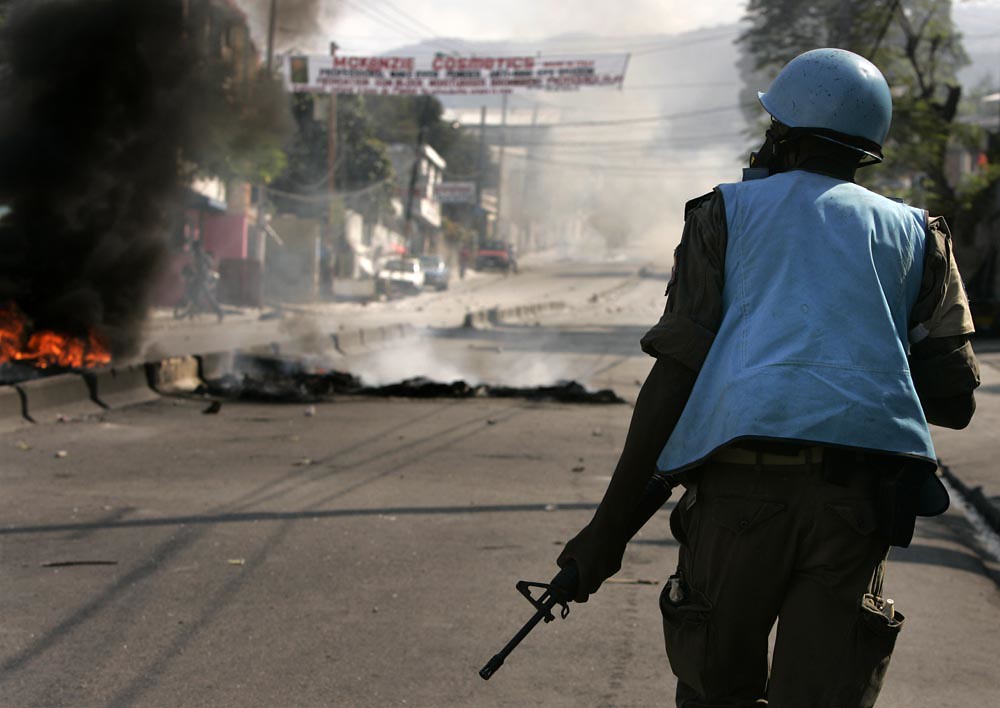In his book entitled ” Haiti, an economy of violence (Les Éditions Pédagogie nouvelle, SA, 2019), the economist Fritz Alphonse Jean reveals the workings of an economy plagued by violence and the control exercised by three dominant groups: the traditional bourgeoisie, political entrepreneurs and senior government officials. the state. This book, which served as the basis for our research, sheds light on the mechanisms by which these groups take advantage of armed gangs to protect their interests, crush competition and influence elections.
The support of armed gangs has become a valuable economic asset
The traditional business sector, political entrepreneurs and high civil servants, such as ministers and chief executives, are the main players in this economy of violence. Captive state institutions, such as customs, ports and state banks, are used as instruments to serve the interests of these groups. In this context, the support of armed gangs becomes a valuable economic asset that is distributed among these actors.
These dominant groups invest in armed gangs to ensure their protection, control territories, eliminate competitors, organize kidnappings, terrorize the population and divert goods belonging to small traders. Moreover, they use gangs to influence election results, thereby securing their grip on political power.
Penalties have been imposed by the United States, France et le canada to certain politicians and businessmen of the Haitian bourgeoisie for their implication in the creation, the arming and the support of the criminal activities of the gangs. These sanctions reveal the extent of the collusion between elites and gangs in Haiti.
READ ALSO
How to fight against insecurity in Haiti?
In his book, Fritz Alphonse Jean exposes the “toxic” situation of the Haitian state, prisoner of this armed violence. However, it also evokes hope for a transition to shared economic leadership in the digital age. It calls for deconstructing this economy of violence to begin a transition to an economy of shared prosperity.
To achieve this transition, it is crucial to put an end to the impunity enjoyed by the dominant groups and to restore the rule of law. This requires deep reforms of the Haitian political and economic system, as well as the mobilization of civil society and the international community to support the construction of a better future for Haiti.
Priorities to be implemented for lasting stability
The road to a more stable and prosperous future for Haiti involves several essential steps. Here are some of the measures that could be implemented to combat the economy of violence and foster a transition to an economy of shared prosperity.
- Strengthening the rule of law: The establishment of an independent and efficient judiciary is essential in the fight against corruption and impunity. Justice must be able to prosecute and punish individuals involved in criminal activities, including elites and gang members.
- Political reforms: Political reforms are needed to ensure transparent and accountable governance. This includes the promotion of free and fair elections, the fight against clientelism and corruption, as well as the decentralization of power to promote citizen participation and regional autonomy.
- Economic reforms: The diversification of the Haitian economy and the promotion of investment in productive sectors are essential to create jobs and generate growth. Economic policies should aim to reduce inequalities, encourage entrepreneurship and facilitate access to credit for small and medium-sized enterprises.
- Investment in education and training: Improving the education system is crucial to forming a skilled and competitive workforce. Increased investment in education, especially in the areas of science, technology and innovation, is essential to prepare Haiti for the digital age and foster an economy of shared prosperity.
- Strengthening public safety: The reform and professionalization of the security forces are essential to ensure the protection of citizens and to combat armed gangs. International cooperation can play a key role in training and equipping Haitian security forces.
- Support for civil society: Strengthening and promoting civil society makes it possible to build solid democratic institutions and promote citizen participation. Non-governmental organizations and local actors must be encouraged and supported so that they can play an active role in the transformation of Haitian society.
- International cooperation : Collaboration with international partners is essential to support reforms and ensure the implementation of the measures needed to dismantle the economy of violence. International partners must adopt a coordinated approach focused on sustainable development to help Haiti overcome its challenges.
- Disarmament and reintegration programs: A concerted effort to disarm and dismantle armed gangs is essential to restoring peace and security. Disarmament, demobilization and reintegration (DDR) programs can help provide alternatives to gang members, training them and reintegrating them into society, thereby reducing their influence and presence.
- Promotion of human rights: Respect for human rights must be at the heart of all initiatives aimed at restoring stability and prosperity in Haiti. Measures must be taken to protect human rights, including the fight against sexual violence and abuse against children, women and vulnerable people.
- Improvement of infrastructure: Investing in basic infrastructure such as drinking water, electricity, roads, schools and hospitals is crucial to improving the quality of life of Haitians and fostering economic development. Strong infrastructure is essential to attract foreign investment and stimulate economic growth.
- Environmental Protection : Haiti must also commit to protecting and preserving its environment. Deforestation, soil erosion and natural disasters have a huge impact on the lives of Haitians. It is essential to put in place sustainable environmental policies and to promote agricultural practices that respect the environment.
- Promotion of culture and tourism: Haiti has a rich cultural and historical heritage that could be enhanced to stimulate tourism and foster economic development. Promoting Haitian culture and preserving historic sites would help strengthen national identity and attract visitors from around the world.

Inspirational examples for Haiti
By taking these steps and resolutely committing to the path of change, Haiti can transform its economy of violence. It is crucial that Haitian society and the international community work hand in hand to support and encourage these efforts, in order to enable Haiti to recover and build a better future for its citizens. The situation in Haiti requires concerted action to end the economy of violence and foster a transition to an economy of shared prosperity. Countries such as Colombia and Rwanda, which have experienced similar problems of violence and instability, can serve as inspiring examples for Haiti.
READ ALSO
Letter from a migrant from “Roxham Road” to the Prime Minister of Quebec
Colombia has managed to significantly reduce violence linked to drug cartels and armed groups through peace initiatives, justice reform and DDR (Disarmament, Demobilization and Reintegration) programs. Rwanda, meanwhile, has rebuilt itself after a devastating genocide by investing in education, infrastructure and national reconciliation. These examples show that serious social, political and economic problems can be overcome with strong political will, civil society engagement and international support.
Haiti has the potential to follow the path of these countries and reinvent itself as a resilient, stable and prosperous nation. To do this, it is essential to implement deep structural reforms, invest in human development and engage in close collaboration with the international community. By working together and learning from the successes of other nations, Haiti can overcome its challenges and build a better future for all of its citizens.

